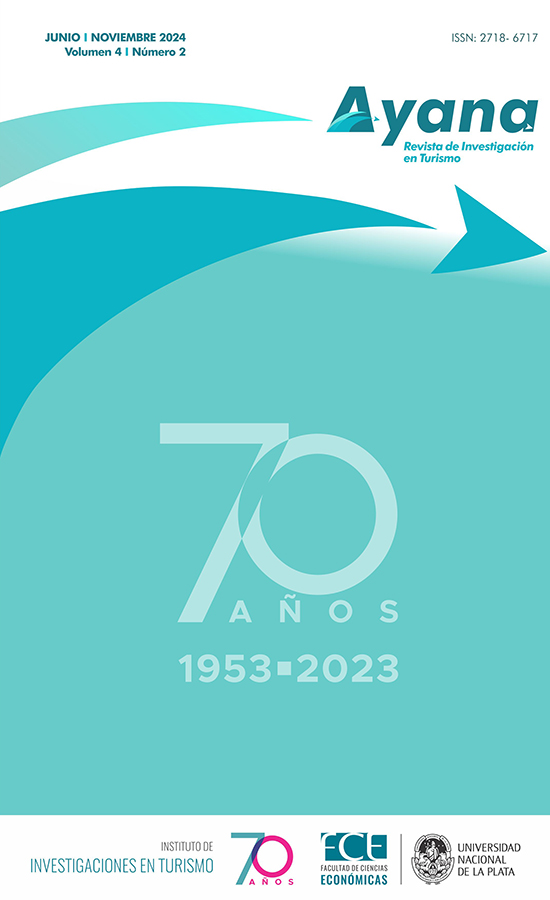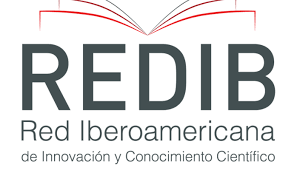Travel cycle of smart tourists: Impact on satisfaction, intention to return, and recommendation of the tourist destination
DOI:
https://doi.org/10.24215/27186717e050Keywords:
smart tourism, tourism destination, loyalty, customer journey, smart tourism technologyAbstract
The study analyzes the impact of smart tourism on satisfaction, intention to return, and recommendation among tourists from the outbound market of Córdoba, Argentina. A sample of 472 respondents over 18 years old who had traveled in the last year revealed that smart tourist behavior is associated with higher levels of satisfaction, greater intention to return, and recommendation of the destination. Specifically, pre-travel behavior positively influences satisfaction, intention to return, and recommendation. During the stay, the impact is mainly observed in the intention to return and recommendation. However, in the post-travel stage, smart tourist behavior seems to have no significant effect on loyalty to the destination. These findings open new opportunities to develop smart tourism technologies and services that enhance the tourist experience and their relationship with the destination.
Downloads
References
Azis, N., Amin, M., Chan, S. y Aprilia, C. (2020). How smart tourism technologies affect tourist destination loyalty. Journal of Hospitality and Tourism Technology, 11(4), 603-625. https://doi.org/10.1108/JHTT-01-2020-0005
Boe, K., Buhalis, D. y Inversini, A. (2015). Conceptualising smart tourism destination dimensions. En I. Tussyadiah y A. Inversini (Eds.), Information and communication technologies in tourism 2015 (pp. 391-403). Springer International Publishing.
de la Ballina Ballina, F. J. (2017). Marketing turístico aplicado. ESIC.
Expedia Group. (2023). Traveler insights report 2023 Q1. Expedia Group.
Femenia-Serra, F., Neuhofer, B. e Ivars-Baidal, J. A. (2019). Towards a conceptualisation of smart tourists and their role within the smart destination scenario. Service Industries Journal, 39(2), 109-133. https://doi.org/10.1080/02642069.2018.1508458
Fu, X. (2019). Existential authenticity and destination loyalty: Evidence from heritage tourists. Journal of Destination Marketing and Management, 12, 84-94. https://doi.org/10.1016/j.jdmm.2019.03.008
Gajdošík, T. (2020). Smart tourists as a profiling market segment: Implications for DMOs. Tourism Economics, 26(6), 1042-1062. https://doi.org/10.1177/1354816619844368
Global System for Mobile Communications Association. (2021). GSMA Mobile Connectivity Index. https://www.mobileconnectivityindex.com/#year=2021&zoneIsocode=ARG
Gretzel, U., Sigala, M., Xiang, Z. y Koo, C. (2015). Smart tourism: Foundations and developments. Electronic Markets, 25(3), 179-188. https://doi.org/10.1007/s12525-015-0196-8
Gutauskas, F. A., Oliva, L. y Zanfardini, M. (2021). Viaje de consumo turístico de los y las pampeanos/as en contexto COVID-19. Anuario Nueva Época, 18(18), 47-63.
Gutauskas, F. A. y Zanfardini, M. (2022). El viaje del consumo turístico. Revisión bibliográfica y propuesta metodológica para su estudio. Marketing de Servicios: Su Esencia, 1(1), 57-74.
Homburg, C. y Giering, A. (2001). Personal characteristics as moderators of the relationship between customer satisfaction and loyalty: An empirical analysis. Psychology & Marketing, 18(1), 43-66. https://doi.org/10.1002/1520-6793(200101)18:1<43::AID-MAR3>3.0.CO;2-I
Jovicic, D. Z. (2019). From the traditional understanding of tourism destination to the smart tourism destination. Current Issues in Tourism, 22(3), 276-282. https://doi.org/10.1080/13683500.2017.1313203
Kiatkawsin, K., Sutherland, I. y Lee, S. K. (2020). Determinants of smart tourist environmentally responsible behavior using an extended norm-activation model. Sustainability (Switzerland), 12(12). https://doi.org/10.3390/SU12124934
Lemon, K. N. y Verhoef, P. C. (2016). Understanding customer experience throughout the customer journey. Journal of Marketing, 80(6), 69-96. https://doi.org/10.1509/jm.15.0420
Municipalidad de Córdoba. (3 de octubre de 2022). La Ciudad de Córdoba recibió una mención especial como destino turístico inteligente. Córdoba capital. https://cordoba.gob.ar/la-ciudad-de-cordoba-recibio-una-mencion-especial-como-destino-turistico-inteligente/
Organización Mundial del Turismo y Comisión Europea de Turismo. (2011). Manual sobre branding de destinos turísticos. Organización Mundial del Turismo y Comisión Europea de Turismo. https://doi.org/10.18111/9789284413706
Shen, S., Sotiriadis, M. y Zhou, Q. (2020). Could smart tourists be sustainable and responsible as well? The contribution of social networking sites to improving their sustainable and responsible behavior. Sustainability (Switzerland), 12(4). https://doi.org/10.3390/su12041470
Smartvel. (2023). The ultimate travel trends for 2023. Smartvel blog. https://blog.smartvel.com/blog/the-ultimate-travel-trends-for-2023
Sociedad Mercantil Estatal para la Gestión de la Innovación y las Tecnologías Turísticas. (2015). Libro Blanco de destinos turísticos inteligentes. Informe destinos turísticos inteligentes: construyendo el futuro. Sociedad Mercantil Estatal para la Gestión de la Innovación y las Tecnologías Turísticas.
Statista. (30 de junio de 2022). Usuarios de smartphones en Argentina 2015-2026. https://es.statista.com/estadisticas/598527/numero-de-usuarios-de-moviles-en-argentina/
Tasci, A. D. A. (2016). A quest for destination loyalty by profiling loyal travelers. Journal of Destination Marketing & Management, 6(3), 207-220. https://doi.org/10.1016/j.jdmm.2016.04.001
Tripadvisor. (2023). An Economic Portrait of the Traveler. The spending power of explorers and how their influence extends across industries. Tripadvisor.
Wangenheim, F. (2003). Situational characteristics as moderators of the satisfaction-loyalty link: An investigation in a business-to-business context. Journal of Consumer Satisfaction Dissatisfaction and Complaining Behavior, 16, 145-156.
Zhang, Y., Sotiriadis, M. y Shen, S. (2022). Investigating the impact of smart tourism technologies on tourists’ experiences. Sustainability (Switzerland), 14(5). https://doi.org/10.3390/su14053048
Downloads
Published
How to Cite
Issue
Section
License
Copyright (c) 2024 Enrique Carlos Bianchi, Marina Zanfardini

This work is licensed under a Creative Commons Attribution-ShareAlike 4.0 International License.
Those authors who have publications with this journal, agree with the following terms:
a. Authors will retain its copyright and will ensure the rights of first publication of its work to the journal, which will be at the same time subject to the Creative Commons Atribución-NoComercial-SinDerivadas 4.0 Internacional (CC BY-NC-ND 4.0) allowing third parties to share the work as long as the author and the first publication on this journal is indicated.
b. Authors may elect other non-exclusive license agreements of the distribution of the published work (for example: locate it on an institutional telematics file or publish it on an monographic volume) as long as the first publication on this journal is indicated,
c. Authors are allowed and suggested to disseminate its work through the internet (for example: in institutional telematics files or in their website) before and during the submission process, which could produce interesting exchanges and increase the references of the published work. (see The effect of open Access)

























